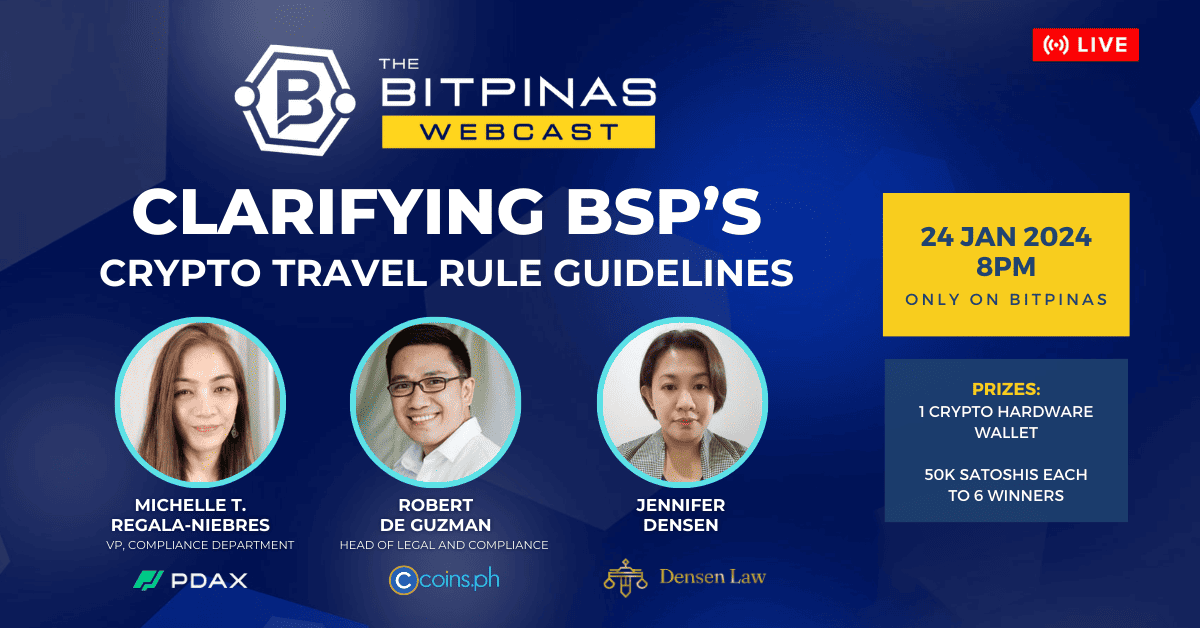Clarifying BSP’s Crypto Travel Rule Guidelines | Webcast 36
This is the recap of the 36th episode of the BitPinas Webcast with Atty. Jennifer Densen, who serves as legal counsel for Bitshares Labs and is the founder of Densen Law; Atty. Robert De Guzman of Coins.ph; and Atty. Michelle Regala Niebres from PDAX.

In December 2023, the Bangko Sentral ng Pilipinas (BSP) published a memorandum about the “Clarification on the Implementation of the Philippine Travel Rule (PHTR) for Virtual Asset Service Providers (VASPs).”
The three-page memorandum aimed to clarify the applicability of transaction thresholds, expectations on transactions with jurisdictions without the travel rule, the applicability of the PHTR to non-custodial VASPs, and regulatory expectations on transactions with unhosted wallets.
To learn more about the memorandum, go here: BSP Clarifies Crypto Travel Rule on P2P Transactions
However, not all Filipino crypto enthusiasts are aware of the travel rule, why it was clarified, and why the BSP implements it for crypto transactions.
With this, the BitPinas has invited lawyers from the crypto industry in the country to explain to the #CryptoPH community the concerns about this PHTR, what could be the effect of this regulation on the market, and other questions regarding this rule.
This is the recap of the 36th episode of the BitPinas Webcast with Atty. Jennifer Densen, who serves as legal counsel for Bitshares Labs and is the founder of Densen Law; Atty. Robert De Guzman of Coins.ph; and Atty. Michelle Regala Niebres from PDAX.
Table of Contents
Video
Watch on Facebook or on YouTube here:
Episode Notes
Travel Rule Explained by a Legal Expert
- Densen: “Ito iyong guidelines or rules para sa transactions involving virtual assets. This rule would govern iyong transfer transactions. If you would be transferring a virtual asset, so there’s this rule that states that we should know the originating body, person, or institution, and the receiving or beneficiary.” )
- (Read more about the Travel Rule here.)
- Basically, the travel rule seeks to identify the sender and the receiver of the crypto asset—the name of those persons or institutions, their addresses, the amount and source of the transaction, and sometimes, the reason.
The Impacts of Philippine Crypto Travel Rule (PHTR) on a Licensed Exchange
- The travel rule is part of a broader set of recommendations by the global anti-money laundering watchdog, the Financial Action Task Force (FATF), designed to prevent illegal activities like money laundering.
- To be able for the BSP to identify the information needed for a transaction, the VASPs are the key players.
- From the perspective of the locally licensed exchanges in the country, lawyers from Coins.ph and PDAX explained their experiences with how the PHTR affects their operations.
- For De Guzman, the BSP’s implementation of the PHTR helps exchanges identify which information they will collect on their users.
- De Guzman: “Because that information also helps the consumers, our users. We can protect them against fraud (because) this actually enhances the transparency of the transaction. It also helps us into the traceability of the transaction, especially so that it’s happening on the blockchain.”
- Meanwhile, Niebres shared that the PHTR has a two-fold impact on the PDAX operations.
- Niebres: “While we want to understand how we can comply with all of the requirements, we want to be able to operationalize it as well. It means na parang clear sa amin kung ano iyong standards, requirements, kanino ba mag-aaply. So, there’s a lot of thinking and designing involved internally. But on the other hand there’s also the economics part of it. Meaning, kailangan ba naming kumuha ng vendor pa ma-implement ito, o maghanap ng solution.”
Pros and Cons of PHTR on End Users
- According to Densen, one of the disadvantages of the travel rule is that users cannot maintain their anonymity because some of their information should be collected.
- The advantages, meanwhile, include the safety, security, and legitimacy of the transaction. This is because users do not know when they will need the information, especially if accidents or fraud happen.
- “In the end, I think the pros outweigh the cons,” Densen emphasized.
Clarification 1: Transactional Requirements for VASPs
- In the memorandum, it was clarified that VASPs should collect the name of the originator, the name of the beneficiary, and the account of both for transactions below ₱50,000.
Does PHTR Conflict With Data Privacy Law?
- De Guzman: “In the Philippines, it should not. It should not actually be in conflict with the data privacy laws. Unang-una, when you transact with a regulated exchange, ano iyong pinaka-importanteng element to provide an exchange? Iyon iyong tinatawag nating consent. We need your consent in order for us to assist and serve you and with that consent, being given then we can provide our services, we can provide you our products.”
Will PHTR Affect Crypto’s Decentralized Nature?
- Densen: “Itong nangyayari ngayon sa travel rule, it is not really impeding on deregulation or decentralization of cryptocurrencies dahil hindi nito nire-regulate on how to put value or paano yung overall transactions of virtual assets. And nre-regulate kasi rito is iyong transfers of funds, hindi nito pinapakialaman kung paano na create yung (funds).”
- Moreover, Densen highlighted that these regulations should not be seen as an industry killer but instead as helpful tools to avoid money laundering.
Clarification 3: Applicability of PHTR to Non-Custodial VASPs
- Non-custodial VASPs are also licensed VASPs but do not have custody over their users’ virtual assets. PDAX and Coins.ph are both custodial VASPs.
Clarification 4: Transactions to/from Unhosted Wallets
- Unhosted wallets include MetaMask and other non-VASPs in the country. Transactions also happen peer-to-peer.
- For Densen, though the PHTR does not cover unhosted wallets and p2p transactions, there are still regulations by the BSP that cover them.
- However, the BSP wrote in the memorandum that VASPs are still obliged to gather information on the sender and receiver of the transaction even if the transaction involves an unhosted wallet. And when the information available is incomplete, the transfer should not be completed or the asset should not be transferred.
- This is where De Guzman shared that there is a standard for this practice: “Based on the recommendation number 16, there is a standard. If you look at BSP circular 1108, There are certain information that (the VASP) have to request from these users. Both from the originator and then from the beneficiary. Among those information you have the name, the wallet address, if that’s not available, the transaction hash. You also have to get the ID or geographic address or education of that user. And then for the beneficiary, it’s basically the same, the name, the address, and then the wallet used for the wallet address the beneficiary.”
Will PHTR Kill Crypto Trading?
- Collectively, the lawyers explained that the travel rule was implemented to monitor transactions only. It is because, for instance, if fraud happens, VASPs and regulators could easily detect the bad actors involved in those transactions.
- At the end of the day, regulations are here to protect investors and not to control or kill the industry, they concluded.
Disclaimer:
- Before investing in any cryptocurrency, it is essential that you carry out your own due diligence and seek appropriate professional advice about your specific position before making any financial decisions.
- BitPinas provides content for informational purposes only and does not constitute investment advice. Your actions are solely your own responsibility. This website is not responsible for any losses you may incur, nor will it claim attribution for your gains.







![PDAX April Cashback Promo (Apr. 3 - 30, 2020) [Use the Code BITPINAS] 8 PDAX April Cashback Promo (Apr. 3 – 30, 2020) [Use the Code BITPINAS]](https://bitpinas.com/wp-content/uploads/2020/04/2-2-1-768x402.png)
![[Newsletter] CryptoPH Wrap-up - BSP Wants More Crypto Surveillance? 9 [Newsletter] CryptoPH Wrap-up – BSP Wants More Crypto Surveillance?](https://bitpinas.com/wp-content/uploads/2022/07/CRYPTO-INSIGHT-NEWSLETTER-1-1-768x402.png)

![[BBB May Recap] Key Factors Affecting Crypto Trading and Investment Strategies 11 [BBB May Recap] Key Factors Affecting Crypto Trading and Investment Strategies](https://bitpinas.com/wp-content/uploads/2023/05/bbb-may-2023-768x402.jpg)
